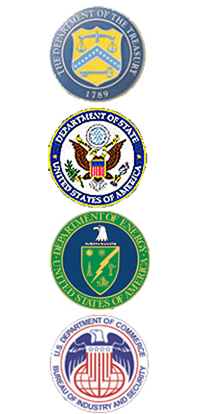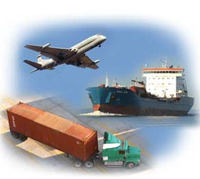Disclaimer
This is an information page designed to provide a general overview of export controls. It by no means is an all-inclusive source. It is the responsibility of each company to contact the appropriate agency for specific licensing guidance!
Can I Export?
Important Questions to Ask:
- What am I exporting?
- Where is the product going?
- Whom will ultimately receive the product?
- What will be the end-use of the product?
General Background
Most export transactions do not require specific approval from the U.S. Government. However, certain export transactions require legal permission called a license prior to export. Licenses are required in certain situations involving national security, foreign policy, short-supply, nuclear non-proliferation, missile technology, chemical and biological weapons, regional stability, crime control, or terrorist concerns. Please see below to learn more about the agencies that regulate the export of your products.
The Four Most Common Regulatory Bodies
- Office of Foreign Assets Control
(Department of the Treasury) - The Directorate of Defense Trade Controls
(Department of State) - U.S. Nuclear Regulatory Commission
(Department of Energy) - The Bureau of Industry & Security
(Department of Commerce)
Office of Foreign Assets Control (OFAC)
The Office of Foreign Assets Control ("OFAC") of the US Department of the Treasury administers and enforces economic and trade sanctions based on US foreign policy and national security goals against targeted foreign countries, terrorists, international narcotics traffickers, and those engaged in activities related to the proliferation of weapons of mass destruction. OFAC acts under Presidential wartime and national emergency powers, as well as authority granted by specific legislation, to impose controls on transactions and freeze foreign assets under US jurisdiction.
http://www.treas.gov/offices/enforcement/ofac/
COMPANIES SHOULD CONTACT THE AGENCY FOR SPECIFIC LICENSING GUIDANCE!
The Directorate of Defense Trade Controls (DDTC)
The U.S. Government views the sale, export, and re-transfer of defense articles and defense services as an integral part of safeguarding U.S. national security and furthering U.S. foreign policy objectives. The Directorate of Defense Trade Controls (DDTC), in accordance with 22 U.S.C. 2778-2780 of the Arms Export Control Act (AECA) and the International Traffic in Arms Regulations (ITAR) (22 CFR Parts 120-130), is charged with controlling the export and temporary import of defense articles and defense services covered by the United States Munitions List (USML).
COMPANIES SHOULD CONTACT THE AGENCY FOR SPECIFIC LICENSING GUIDANCE!
U.S. Nuclear Regulatory Commission (NRC)
NRC is a U.S Department of Energy agency charged with regulating the Nation's civilian use of byproduct, source, and special nuclear materials to ensure the adequate protection of the public's health, safety, and environment. The NRC authorizes exports of nuclear material in certain forms and/or as contained in consumer products, to any country not listed in 10 CFR 110.28 as an embargoed destination or in 10 CFR 110.29 as a restricted destination. Criteria for NRC export license authorizations can be found at the address below under the "What We Do" tab / section: International programs.
COMPANIES SHOULD CONTACT THE AGENCY FOR SPECIFIC LICENSING GUIDANCE!
The Bureau of Industry and Security (BIS)
BIS is a U.S. Department of Commerce agency charged with advancing U.S. national security, foreign policy, and economic interests. Specifically, BIS is responsible for implementing and enforcing the Export Administration Regulations (EAR), which regulate the export and re-export of most commercial items. These items are generally known as "dual-use" items and have both commercial and military or proliferation applications.
http://www.bis.doc.gov/Licensing/ExportingBasics.htm
COMPANIES SHOULD CONTACT THE AGENCY FOR SPECIFIC LICENSING GUIDANCE!
Commodity Classification
Outside of evaluating whether a particular export country is under an embargo, a company can apply for a commodity jurisdiction (CJ) request. A BIS CJ request determines whether an item or service is subject to the export licensing authority of the Office of Foreign Assets Control (Treasury Department), Directorate of Defense Trade Controls DDTC (Department of State), the Nuclear Regulatory Commission (Department of Energy), or the Bureau of Industry and Security (Department of Commerce). This process is the safest and surest method of evaluating whether a particular product is regulated. A CJ can be done on-line via the SNAP program or via paper version through the mail. A CJ determination will only identify the proper licensing authority for an item, and is not a license or approval to export. A company must in turn apply for a subsequent license for export approval if so required by the CJ.
Important Lists to Check
As part of any good export control process, a company should also
review several lists upon which the U.S. Government has placed
individuals and entities to whom and to which no exports are
permitted no matter what product you produce. These lists should
be reviewed prior to each export transaction
and it is also recommended before going through the trouble of
applying for a license.
- Denied Persons List
- Unverified List
- Entity List
- Specially Designated Nationals List
- Debarred List
- Nonproliferation Sanctions
Export Violations and Penalties
Note Exporting in the United States is a privilege, not a right. These cases illustrate the potential consequences companies could face for violating U.S. export laws.

